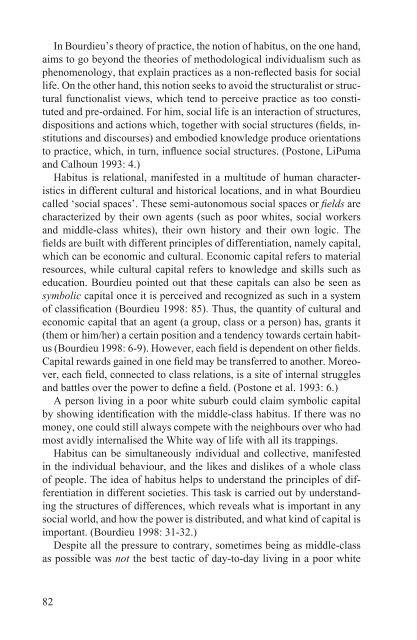The Making of a Good White - E-thesis - Helsinki.fi
The Making of a Good White - E-thesis - Helsinki.fi
The Making of a Good White - E-thesis - Helsinki.fi
Create successful ePaper yourself
Turn your PDF publications into a flip-book with our unique Google optimized e-Paper software.
In Bourdieu’s theory <strong>of</strong> practice, the notion <strong>of</strong> habitus, on the one hand,<br />
aims to go beyond the theories <strong>of</strong> methodological individualism such as<br />
phenomenology, that explain practices as a non-reflected basis for social<br />
life. On the other hand, this notion seeks to avoid the structuralist or structural<br />
functionalist views, which tend to perceive practice as too constituted<br />
and pre-ordained. For him, social life is an interaction <strong>of</strong> structures,<br />
dispositions and actions which, together with social structures (<strong>fi</strong>elds, institutions<br />
and discourses) and embodied knowledge produce orientations<br />
to practice, which, in turn, influence social structures. (Postone, LiPuma<br />
and Calhoun 1993: 4.)<br />
Habitus is relational, manifested in a multitude <strong>of</strong> human characteristics<br />
in different cultural and historical locations, and in what Bourdieu<br />
called ‘social spaces’. <strong>The</strong>se semi-autonomous social spaces or <strong>fi</strong> elds are<br />
characterized by their own agents (such as poor whites, social workers<br />
and middle-class whites), their own history and their own logic. <strong>The</strong><br />
<strong>fi</strong>elds are built with different principles <strong>of</strong> differentiation, namely capital,<br />
which can be economic and cultural. Economic capital refers to material<br />
resources, while cultural capital refers to knowledge and skills such as<br />
education. Bourdieu pointed out that these capitals can also be seen as<br />
symbolic capital once it is perceived and recognized as such in a system<br />
<strong>of</strong> classi<strong>fi</strong>cation (Bourdieu 1998: 85). Thus, the quantity <strong>of</strong> cultural and<br />
economic capital that an agent (a group, class or a person) has, grants it<br />
(them or him/her) a certain position and a tendency towards certain habitus<br />
(Bourdieu 1998: 6-9). However, each <strong>fi</strong>eld is dependent on other <strong>fi</strong>elds.<br />
Capital rewards gained in one <strong>fi</strong>eld may be transferred to another. Moreover,<br />
each <strong>fi</strong>eld, connected to class relations, is a site <strong>of</strong> internal struggles<br />
and battles over the power to de<strong>fi</strong>ne a <strong>fi</strong>eld. (Postone et al. 1993: 6.)<br />
A person living in a poor white suburb could claim symbolic capital<br />
by showing identi<strong>fi</strong>cation with the middle-class habitus. If there was no<br />
money, one could still always compete with the neighbours over who had<br />
most avidly internalised the <strong>White</strong> way <strong>of</strong> life with all its trappings.<br />
Habitus can be simultaneously individual and collective, manifested<br />
in the individual behaviour, and the likes and dislikes <strong>of</strong> a whole class<br />
<strong>of</strong> people. <strong>The</strong> idea <strong>of</strong> habitus helps to understand the principles <strong>of</strong> differentiation<br />
in different societies. This task is carried out by understanding<br />
the structures <strong>of</strong> differences, which reveals what is important in any<br />
social world, and how the power is distributed, and what kind <strong>of</strong> capital is<br />
important. (Bourdieu 1998: 31-32.)<br />
Despite all the pressure to contrary, sometimes being as middle-class<br />
as possible was not the best tactic <strong>of</strong> day-to-day living in a poor white<br />
82
















